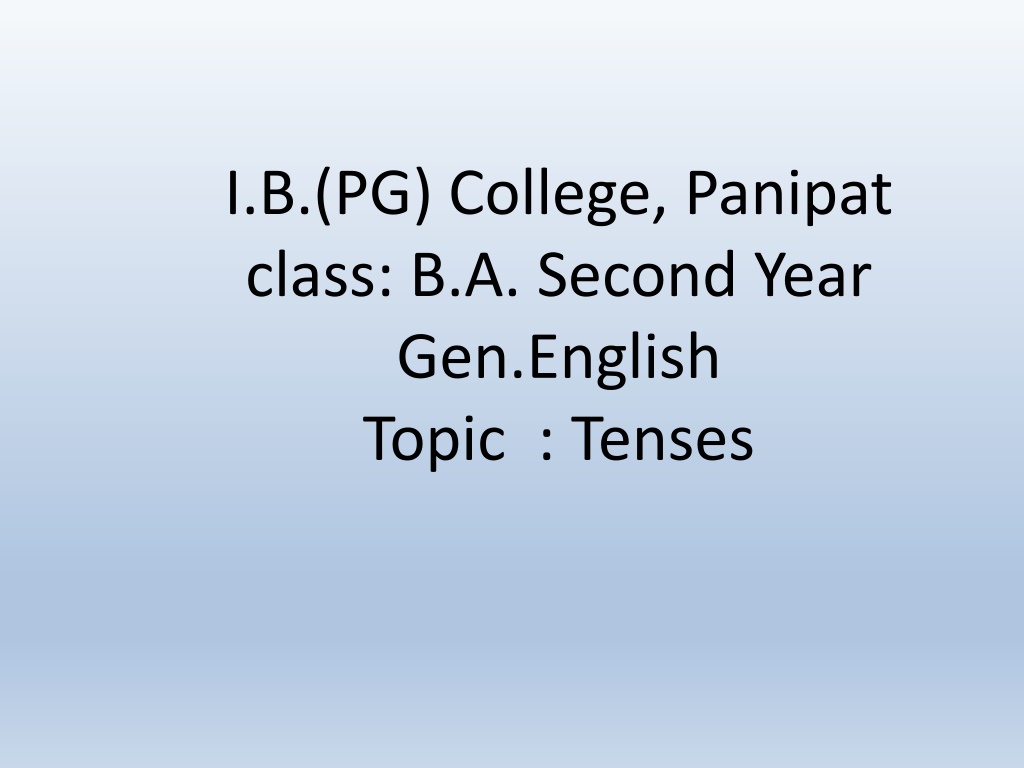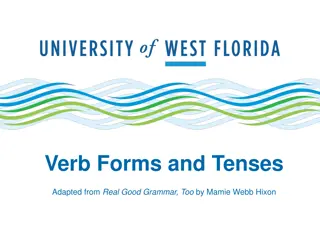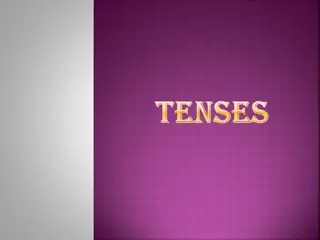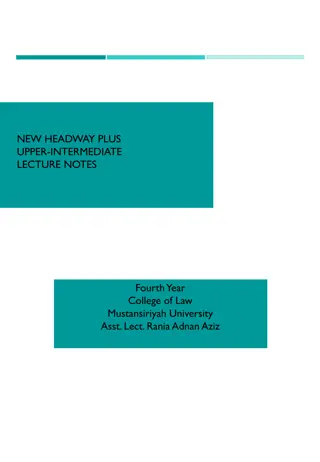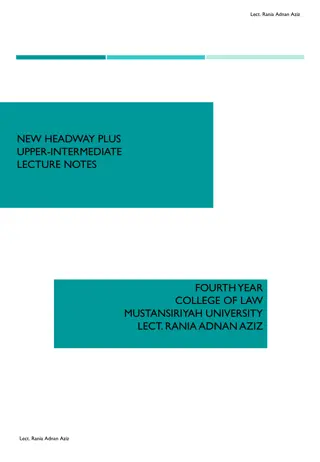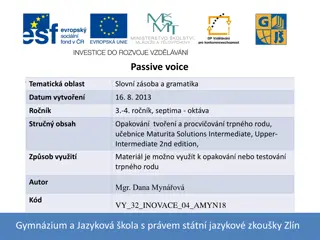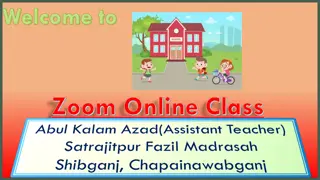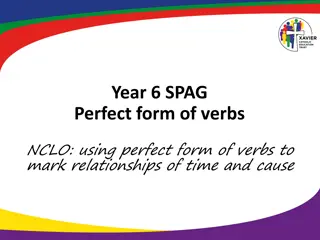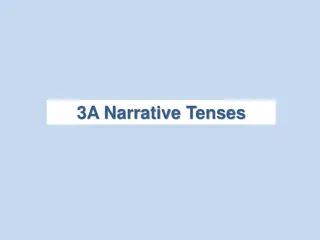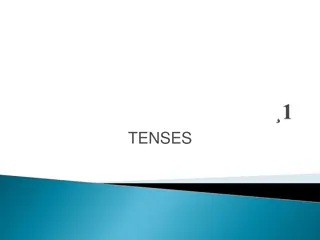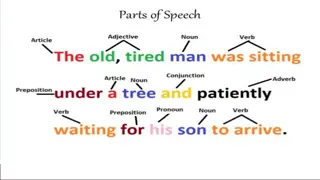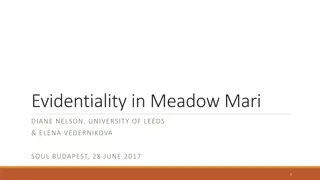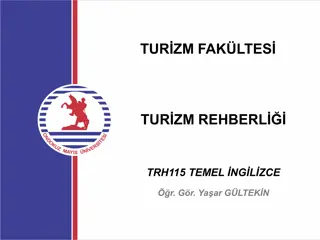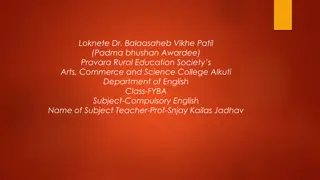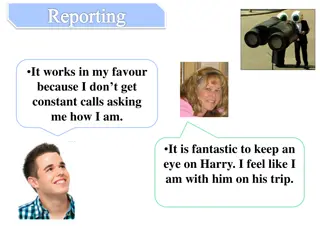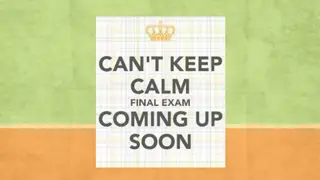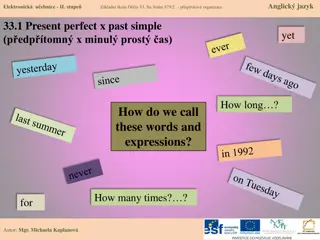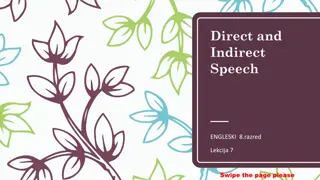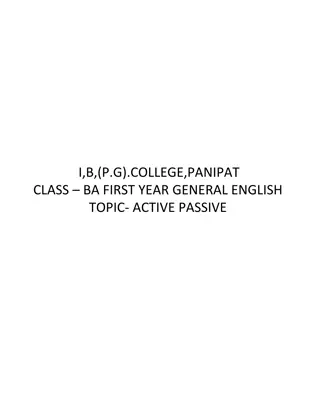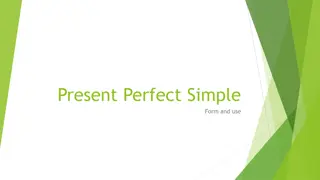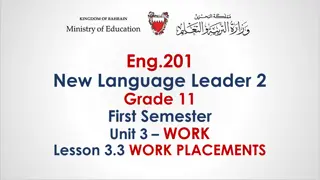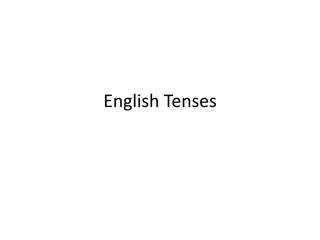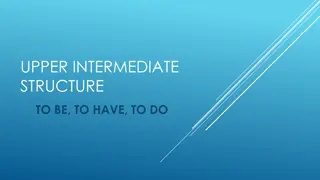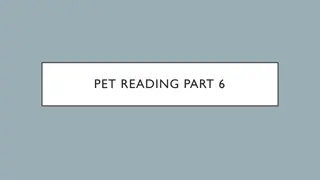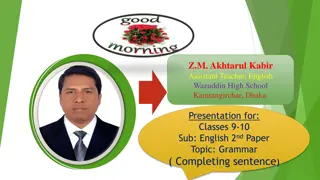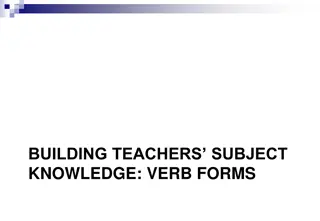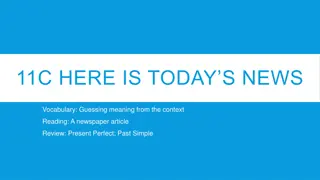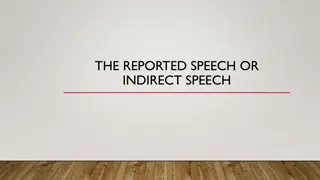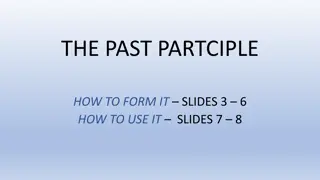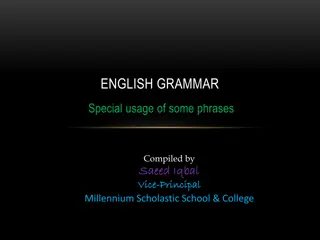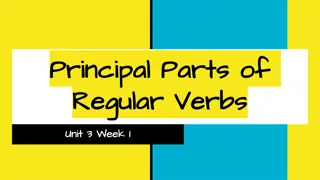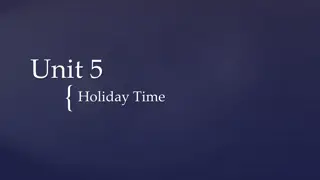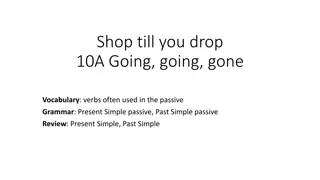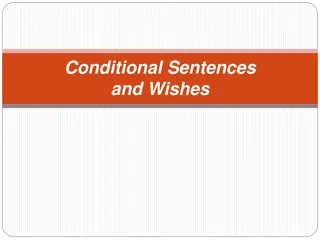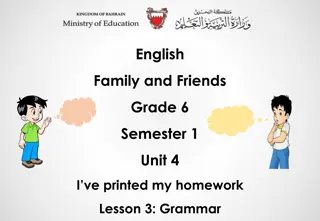Understanding English Tenses: Present, Past, and Future
Understanding tenses in English grammar is essential for effective communication. Tenses indicate the time of an action or event, such as present, past, or future. This article explores the different types of tenses, including present tense, past tense, and future tense, along with examples to help you grasp their usage and significance. Dive into the world of English tenses and enhance your language skills!
Download Presentation

Please find below an Image/Link to download the presentation.
The content on the website is provided AS IS for your information and personal use only. It may not be sold, licensed, or shared on other websites without obtaining consent from the author. Download presentation by click this link. If you encounter any issues during the download, it is possible that the publisher has removed the file from their server.
E N D
Presentation Transcript
I.B.(PG) College, Panipat class: B.A. Second Year Gen.English Topic : Tenses
SINCERE THANKS TO: DR.AJAY KUMAR GARG PRINCIPAL , I.B. (PG) COLLEGE,PANIPAT DR.MADHU SHARMA (H.O.D.)ENGLISH DEPARTMENT
PRESENTED BY : REKHA SHARMA ASSISTANT PROFESSOR ENGLISH DEPARTMENT
ENGLISH GRAMMAR (TENSES)
HOME TENSES EXERCISES What does tense indicate? Exercise 1 Present Tense Exercise 2 Past Tense Exercise 3 Future Tense Exercise 4 Table of English Tenses
WHAT DOES TENSE INDICATE? Tense of a verb indicates the time of an action or any event. As we know, there are three universal times present, past and future. Tenses cover the actions done in those times. The tense also refers to the continuation or completion of an action. However, everything is implied in the three time periods. images.jpg download2.jpg
WHAT DOES TENSE INDICATE? There are primarily three types of tenses of the verb. They are present tense, past tense and future tense. There are subcategories of the three tenses which indicate specific and acute timing of the verb actions. images.jpg download1.jpg
PRESENT TENSE Now read the following sentences: I write. I am writing. I have written. I have been writing. The verbs in all of these sentences refer to the present time, and are, therefore, said to be in the present tense. images.jpg download2.jpg
PRESENT TENSE In sentence 1, however, the verb simply talks about the action. It doesn t state whether the action is complete or not. The verb is therefore said to be in the simple present tense. In sentence 2, the verb shows that the action is incomplete or continuous. The verb is therefore said to be in the present continuous tense. images.jpg download1.jpg download2.jpg
PRESENT TENSE In sentence 3, the verb shows that the action is finished, complete or perfect at the time of speaking. The verb is therefore said to be in the present perfect tense. In sentence 4, the verb is said to be in the present perfect continuous tense because it shows that the action which started at some point of time in the past is still continuing at the moment of speaking. images.jpg download1.jpg
PAST TENSE Just as the present tense has four forms, the past tense also has four forms. I wrote. (Simple past tense) I was writing. (Past continuous tense) I had written. (Past perfect tense) I had been writing. (Past perfect continuous tense) images.jpg
FUTURE TENSE Similarly, the future tense has the following four forms. I will/shall write. (Simple future tense) I will/shall be writing. (Future continuous tense) I will/shall have written. (Future perfect tense) I will/shall have been writing. (Future perfect continuous tense) images.jpg
EXERCISE 1 SIMPLE PRESENT VS PRESENT PROGRESSIVE Use either the simple present or the present progressive of the verbs in parentheses. 1. Diane can t come to the phone because she(wash)________ her hair. 2. Diane (wash)_________ her hair every other day or so. 3. Kathy (sit, usually)___________ in the front row during class. 4. Please be quiet. I (try)_________ to concentrate. 5. (you, lock, always)_________ the door to your apartment when you leave? 6. I wrote to my friend last week. She hasn t answered to my letter yet. I (wait, still)_________ for a reply. 7. After six days of rain, I m glad that the sun (shine)_________ again today. 8. Every morning, the sun (shine)_________ in my bedroom window and (wake)________ me up. 9. A: Look! It (snow)_________. B: It s beautiful. This is the first time I ve seen snow. It (not, snow)__________in my country. images.jpg ANSWERS ANSWERS
ANSWERS SIMPLE PRESENT VS PRESENT PROGRESSIVE 1. Diane can t come to the phone because she(wash)is washing her hair. 2. Diane (wash)washes her hair every other day or so. 3. Kathy (sit, usually)usually sits in the front row during class. 4. Please be quiet. I (try)am trying to concentrate. 5. (you, lock, always)Do you always lock the door to your apartment when you leave? 6. I wrote to my friend last week. She hasn t answered to my letter yet. I (wait, still)am still waiting for a reply. 7. After six days of rain, I m glad that the sun (shine)is shining again today. 8. Every morning, the sun (shine)shines in my bedroom window and (wake)wakes me up. 9. A: Look! It (snow)is snowing. B: It s beautiful. This is the first time I ve seen snow. It (not, snow)does not snow in my country. images.jpg
EXERCISE 2 Fill in each blank space with the correct future verb tense (simple future, future continuous, or future perfect):. 1) Tomorrow I ________ (paint) all day. A) will be painting B) will paint C) will be paint 2) By the time we get there, the store ________ (close). A) will close B) will have closed C) closed 3) I ________ (see) you tomorrow at 3:00 PM. A) will see B) see C) will be seeing images.jpg download2.jpg
EXERCISE 2 Fill in each blank space with the correct future verb tense (simple future, future continuous, or future perfect):. 4) After we finish this video, I ________ (see) all of this director's movies. A) will see B) will be seeing C) will have seen 5) Can I come over in an hour? No, I ________ (clean) the house. A) will clean B) will be cleaning C) clean images.jpg download1.jpg
EXERCISE 3 Instructions: Change the sentences below into the past tense. 1) He must be crazy. He is selling his car for just $10. He________crazy. He sold his car for just $10. 2) He might be able to do it. He_______to do it. 3) I know he'll be there. I_________there. 4) You should go to the doctor's. You_________to the doctor's. 5) My car won't start. My car_________start. images.jpg ANSWERS ANSWERS
ANSWERS Instructions: Change the sentences below into the past tense. 1) He must be crazy. He is selling his car for just $10. He must have been crazy. He sold his car for just $10. 2) He might be able to do it. He might have been able to do it. 3) I know he'll be there. I knew he d be there. 4) You should go to the doctor's. You should have gone to the doctor's. 5) My car won't start. My car wouldn t start. images.jpg
QUESTION 4 Instructions: Complete the sentences below by putting the verb in brackets into the past simple or past perfect. 1) While I was away on holiday, my sister (fall)______ ill and I had to come home. 2) By the time we reached Frankfurt I (already/be)________ very tired of driving. 3) There was a terrible atmosphere in the room. They (have)_______ an argument just before I came. 4) She (be)_________ a teacher before she became a journalist. 5) I gave my friend directions to my house, but later realized that I (forgot)________ to give her the exact address. 6) I got to work this morning and was angry when I saw that no one (arrive)__________ yet. 7) He awoke thinking he was in a prison and that he'd been arrested for robbery. He then realized that it (all/be)________just a bad dream. 8) Michael had a black eye. It looked as if he (be)_______ in a fight. images.jpg ANSWERS ANSWERS
ANSWERS Instructions: Complete the sentences below by putting the verb in brackets into the past simple or past perfect. 1) While I was away on holiday, my sister (fall)fell ill and I had to come home. 2) By the time we reached Frankfurt I (already/be)was already very tired of driving. 3) There was a terrible atmosphere in the room. They (have)had had an argument just before I came. 4) She (be)was a teacher before she became a journalist. 5) I gave my friend directions to my house, but later realized that I (forgot)had forgotten to give her the exact address. 6) I got to work this morning and was angry when I saw that no one (arrive)had arrived yet. 7) He awoke thinking he was in a prison and that he'd been arrested for robbery. He then realized that it (all/be)had all been just a bad dream. 8) Michael had a black eye. It looked as if he (be)had been in a fight. images.jpg
TABLE OF ENGLISH TENSES images.jpg
pombobranco pombobranco
